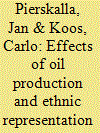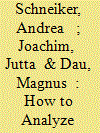| Srl | Item |
| 1 |
ID:
148934


|
|
|
|
|
| Summary/Abstract |
A large qualitative literature on violent conflict in Nigeria has identified the importance of oil production and ethnicity as salient factors in understanding violence, especially in the oil-rich Niger Delta. This resonates with the broader literature on natural resources, ethnic exclusion, and conflict. This article advances existing research by providing the first highly disaggregated statistical analysis of oil, ethnicity, and violence for Nigerian Local Government Areas (LGAs). We test whether oil production in a weak state environment, and local groups’ access to governmental power, affect the level of violence in Nigeria. We employ unique disaggregated data on violent conflict events, proprietary data on oil production, and newly collected information on local ethnic groups’ access to the federal government for 774 LGAs. We find strong evidence that LGAs with oil infrastructure experience significantly more violence than others, while access to the federal government significantly reduces violence. We complement these findings with a qualitative investigation of violent conflicts in Nigeria.
|
|
|
|
|
|
|
|
|
|
|
|
|
|
|
|
| 2 |
ID:
165256


|
|
|
|
|
| Summary/Abstract |
Social scientists and international relations scholars are increasingly analyzing data collected from Twitter or Facebook to examine political processes in which social media are used. The sheer amount of web 2.0 data and its heterogeneity (including text, photos, and videos), however, pose challenges which analysts frequently seek to overcome through a mixed method approach relying on both quantitative and qualitative methods. This article discusses the advantages and limits of using mixed methods for analyzing social media. We show how the shortcomings of quantitative methods such as sentiment analysis and data mining can be remediated by qualitative content methods in a study of the Twitter activity of private military and security companies (PMSCs).
|
|
|
|
|
|
|
|
|
|
|
|
|
|
|
|